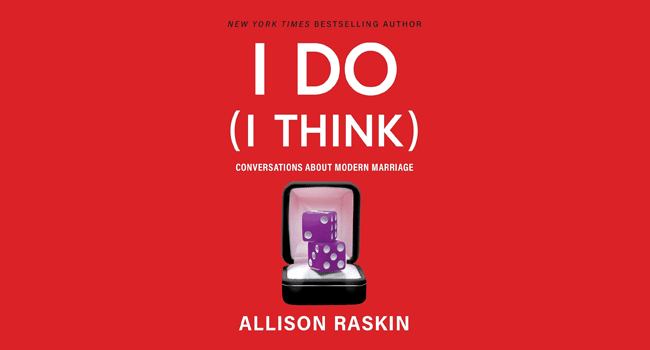Welcome to 2025, another year and another book. I had a bit of downtime over the holidays and read “I Do (I Think)” by Allison Raskin. The book is a modern, feminist guide to rethinking relationships, marriage, and all the messy, beautiful parts in between. Allison blends humor, real talk, and some eye-opening truths about how relationships are evolving in a world that no longer fits the “leave it to Beaver” mold.
Marriage: More Customizable Than Your Starbucks Order
Gone are the days when marriage had one recipe: man, woman, vows, babies, forever. Today, marriage is what you make it. Raskin hammers home the idea that modern couples are rewriting the rules. Want a female-led relationship where you’re calling the shots? Go for it. Prefer separate finances and no white picket fence? That’s cool too. It’s about tossing out the “must-dos” and focusing on the “what-works-for-us.”
Money Matters: Why Cash and Commitment Don’t Always Mix
Let’s get real—money can be a relationship landmine. Raskin points out that these days, many folks think they need financial perfection before tying the knot. The catch? This leaves marriage feeling like a luxury only for the rich. Once you’re hitched, she suggests that keeping some financial independence (think separate bank accounts or clear money boundaries) can actually help your relationship thrive. Less fighting over finances = more loving.
The Rise of Female-Led Relationships
Raskin champions the idea of flipping the script on traditional gender roles. Women leading relationships isn’t about control—it’s about creating balance, respect, and connection. Whether that means she earns more, makes the big decisions, or takes the emotional reins, it’s all about finding what works best for the two of you. These partnerships challenge old norms and build new ones based on equality.
The Divorce Dilemma: Why Compatibility is Queen
Not every marriage lasts forever—and that’s okay. Raskin reminds us that understanding your own needs and expectations before walking down the aisle is critical. This means asking yourself and your partner the hard questions upfront: What does commitment mean to us? How do we handle conflict? It’s better to tackle these tough convos now than deal with the fallout later.
Locking Marriage Down
Allison Raskin’s emphasis on customizing modern relationships aligns seamlessly with the principles of orgasm denial and male chastity in female-led dynamics. These practices embody the book’s call to challenge traditional norms and explore what works best for your unique partnership. Orgasm denial and chastity shift the focus from instant gratification to long-term intimacy, trust, and power dynamics that many couples find deeply fulfilling. In this sense, they align with Raskin’s broader message of reimagining roles and connection within a partnership. By creating new boundaries around physical intimacy, couples open a dialogue about control, pleasure, and emotional closeness that can bring them closer together.
Incorporating male chastity into a relationship exemplifies the trust and communication Raskin advocates for. These dynamics require a heightened awareness of each other’s needs, fostering a deeper emotional bond while encouraging the woman to take the lead. This echoes the book’s celebration of female-led relationships as empowering and balanced partnerships. For couples inspired by Raskin’s call to challenge the status quo, chastity and orgasm denial offer a practical, intimate way to shift dynamics and nurture a partnership rooted in respect, self-control, and mutual satisfaction.
Not Fully Female Led
While the offers a refreshingly modern perspective on marriage and relationships, some aspects don’t fully align with female led relationships. For instance, the book’s emphasis on redefining marriage as a flexible, individualized institution doesn’t explicitly delve into the intentional power imbalances that lend to female-led relationships (FLRs).
While FLRs celebrate women taking control and guiding the relationship, Raskin focuses on balanced partnerships and doesn’t fully acknowledge the inherent strengths and weaknesses between men and women. This could feel like a mismatch for those who enjoy the structured dynamics of FLRs, where one partner assumes a leadership role.
Raskin’s approach to separate finances as a tool for personal autonomy, may feel at odds with couples who view financial surrender as a cornerstone of their relationship dynamic. These subtle differences highlight how Raskin’s ideas, while progressive, may not be the perfect approach if you are exploring a female led dynamic.
Takeaways You Can Actually Use
- Define Your Rules
What does marriage mean to you? Sit down with your partner and write your own playbook. There’s no right or wrong—just what works. - Talk About Money—Now
Don’t wait until the wedding bills roll in. How do you want to handle finances? Shared, separate, or a mix? Clarity is key to harmony. - Embrace the Power Flip
Female-led relationships are more than a trend—they’re a chance to design a partnership that feels fair and empowering. What roles make sense for each of you? - Ask the Big Questions
What’s your vision for the future? Kids? Career changes? Open relationships? Get on the same page now before surprises show up later. - Practice Radical Honesty
Whether it’s about sex, power dynamics, or fears, the more open you are, the stronger your relationship becomes.
Evolving Your Conversation
Here’s your chance to start the talk. Get comfy, pour some wine (or tea), and discuss these with your partner:
- What’s one traditional marriage expectation you’d love to ditch?
- What scares you the most about marriage or long-term commitment?
- What’s one thing we can do now to deepen our communication and connection?
This book is a wake-up call to ditch outdated rules and own your relationship style. It’s a celebration of love on your terms, with all the quirks, shifts, and bold moves that make it uniquely yours. 💍✨








